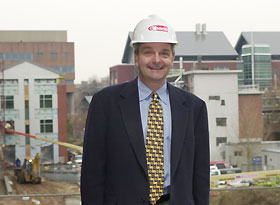|
This is an archived article.
For the latest news, go to the
Advance Homepage
For more archives, go to the Advance Archive/Search Page. | ||
|
As School Of Education Dean, For Richard Schwab, his job as dean of the Neag School of Education is about being an effective facilitator.
It's about securing funding, resources, and support on behalf of his faculty, staff, and students. It's also about ensuring that children - from Connecticut to California - receive a high-quality education, and teachers receive superior training.
Team Leader His role as facilitator has included: fund raising, lobbying, advocating, strategizing, and counseling - all to build the Neag School into one of the nation's top programs in the country. Upon his arrival, he immediately set out to establish a team, while bringing together the faculty of four departments to set a strategic plan for reaching its goal. "This is the accomplishment I'm proudest of," Schwab said. "Our faculty has had to make some very tough decisions about programming and staffing cuts to establish this initiative, and I'm fortunate to have had a great leadership team by my side through it all."
National Recognition In a report earlier this year, the National Commission on Teaching and America's Future, a highly-regarded nonpartisan group of the country's leaders in education, government, and business, cited the Neag School for "producing high quality teachers who stay in the field far longer than many of their U.S. colleagues." The national limelight sparkled on the Neag School a second time this year when it was featured in the U.S. News & World Report annual "Best Graduate Schools" guide. Several months later, Carnegie Corp. of New York designated the Neag School as one of its 11 "Teachers for a New Era" schools. The $5 million grant, awarded to the school in partnership with the College of Liberal Arts and Sciences, supports innovative programs to improve teacher quality throughout the country. "This grant places us in the same league with the likes of Stanford, Michigan State, and the University of Virginia," Schwab says.
Shared Mission "Rich Schwab's greatest strength is his leadership skills," she says. "He has a positive vision and the ability to motivate people and make them believe in a common mission - to become one of the top schools of education in the country." She adds, "He has had an enormous impact on the Neag School, and both his energy and his understanding of the benefits of usingfaculty talents and encouraging collaborative efforts helped us to receive the Carnegie grant."
Increasing Support There are other important numbers that indicate the school's growth and success under Schwab's leadership. For example, the annual dean's fund has grown from $10,000 to $60,000, and during the university's private fund-raising campaign the school has raised more than $30 million in gifts. A large part of that is due to UConn alum Raymond Neag, who gave the school $21 million, which was matched by another $4 million in state funds. At the time, Neag's gift was the largest ever to a school of education in the country and was the largest gift ever to a public university in New England. The dramatic changes underway at the school's home base are also an indicator of the school's climb in stature. Originally, the UConn 2000 campus-wide renovation plans did not include the Charles Burt Gentry Building. But a lobbying effort led by Schwab resulted in a change of plans. With funding from both UConn 2000 and 21st Century UConn, a new 20,000-square-foot addition will open in April. Once this is accomplished, major renovations will begin on the original structure, for a total price tag of $22 million. There are plenty of other notable accomplishments on Schwab's list as well. He encouraged the establishment of an alumni society, which now boasts 1,000 members - one of the largest and most active alumni groups on campus. He instituted a dean's advisory group, consisting of leaders from business, government, and education. He was one of just two deans in the country named to the National Commission on Teaching and America's Future. But his days at the helm haven't been without their disappointments and challenges. Budget cuts, layoffs, and the state's early retirement program resulted in a loss of 20 of the school's staff and faculty. "We've had to trim down, and everyone is working harder with less to accomplish our vision," Schwab explains wistfully. "But in light of those cutbacks we have to consider how our national reputation has grown," says Reis, "and examine how the funding and the number of publications by our faculty have increased. We have fewer people doing more, and doing it well. This says volumes about Rich Schwab as a leader." |

